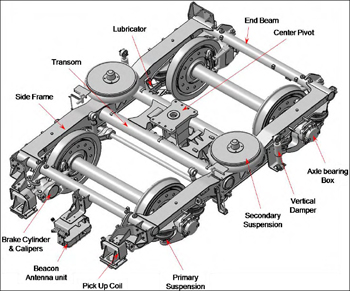Rail researchers shape the future of train design
Thu, 18 Oct 2012 12:52:00 BST
Huddersfield researchers guide the future of cheaper, lighter trains
 Researchers at the University of Huddersfield are to shape the future of train design with a project which will help to make trains cheaper and lighter.
Researchers at the University of Huddersfield are to shape the future of train design with a project which will help to make trains cheaper and lighter.
The research initially aims to establish whether lighter bogies could be developed for use on passenger trains. Bogies are the term given to the heavy cast or welded steel frame which holds the vehicle’s wheels and suspension (pictured right).
They have to absorb the large forces transmitted between the track and vehicle body, so when designing lighter bogies, the key challenge will be to ensure they can withstand these forces over long design lives without fatigue failure.
Assistant Director of the Institute of Railway Research Julian Stow (pictured below) explains: “Developing lighter components offers the possibility of reducing the wear and tear which trains impose on the track as well as reducing the energy which the train consumes”.
 This is important, he continues; “because passenger trains are designed to have a life of more than 30 years – over their whole life the cost savings from using lighter components can be considerable”.
This is important, he continues; “because passenger trains are designed to have a life of more than 30 years – over their whole life the cost savings from using lighter components can be considerable”.
Reducing bogie frame weight is going to require a new approach to design and will include considering whether bogie frames should be replaced during routine overhauls, whether they could be made lighter if the track was smoother and even whether they could monitor their own fatigue life says Railway Engineering Professor Simon Iwnicki: “We will be looking at new materials and different types of suspension – nothing can be ruled out at this stage”.
The three year project is being funded by the Engineering and Physical Sciences Research Council together with industry partners RSSB through an ‘Industrial CASE (iCASE)’ award.
The work was inspired by a seminar organised by RRUKA in association with ATOC in which academics and senior rail industry leaders discussed ways of developing a future ‘half cost’ train.
- The Institute of Railway Research (IRR) provides specialist research and development for the railway industry in many aspects of railway engineering including rail vehicle dynamics and wheel-rail interaction/derailment resistance. The IRR is based in the Faculty of Computing and Engineering at the University of Huddersfield. It supports its research with state-of-the-art computer simulation facilities.
- Industrial CASE (iCASE) awards are an Engineering and Physical Sciences Research Council scheme which provides funding for PhD studentships where businesses take the lead in arranging projects with an academic partner of their choice. The aim of these awards is to provide PhD students with a first-rate, challenging research training experience, within the context of a mutually beneficial research collaboration between academic and partner organisations e.g. industry and policy making bodies.
- RSSB is a not-for-profit company owned and funded by major stakeholders in the railway industry, but is independent of any one party. RSSB is funded by levies on its members and grants for research from the Department for Transport. RSSB’s members include: the infrastructure manager, passenger and freight operating companies, rolling stock leasing companies, infrastructure contractors and suppliers.
- The Rail Research UK Association (RRUKA) is a partnership between the British rail industry and UK Universities. It provides a focus for research institutions who undertake R&D that could be of benefit to the railways and for the railway industry to access academic research capabilities. It brings together those who can use and fund research, with those who do it. In order to do this it provides a forum for targeted knowledge exchange between universities and the industry, including the organisation of focussed workshops and seminars, as well as wider networking opportunities.
- ATOC is the Association of Train Operating Companies.







